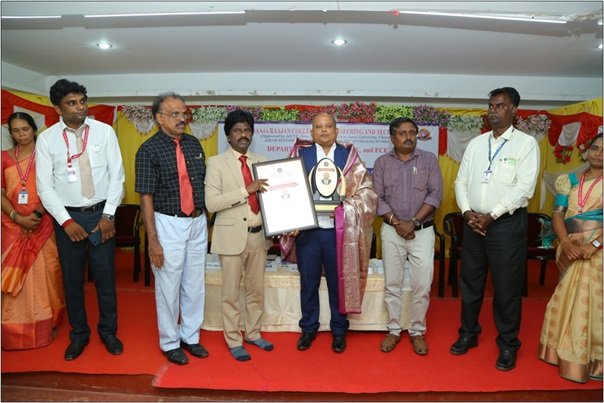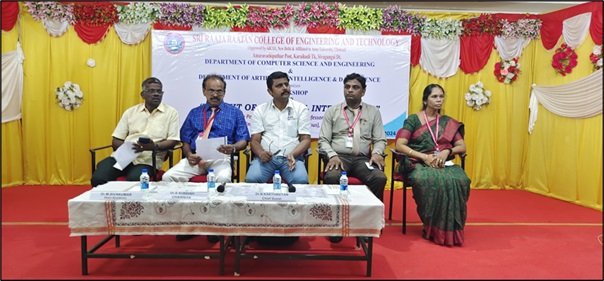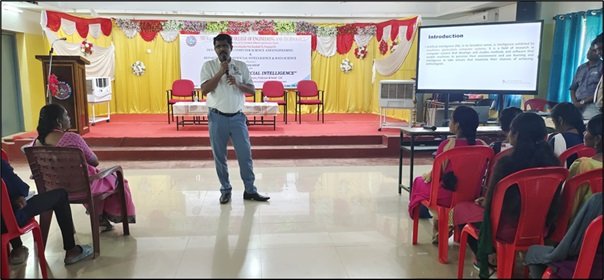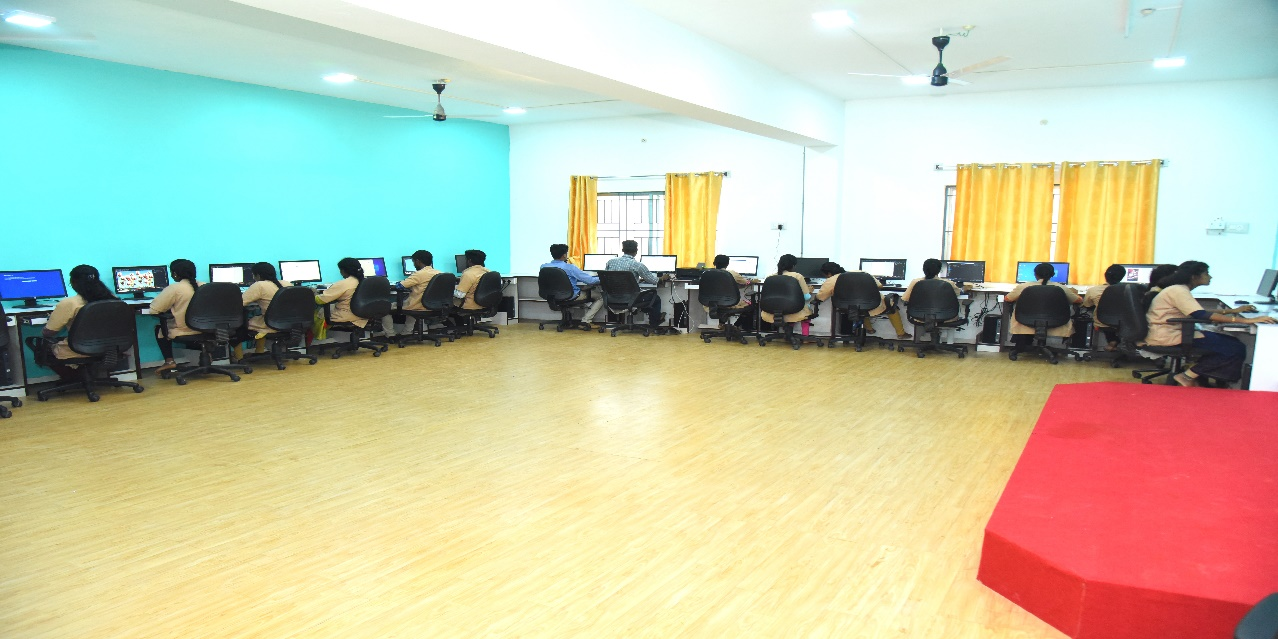-
 Call Now ! Mob : +91 73737 11339 +91 73737 11333
Call Now ! Mob : +91 73737 11339 +91 73737 11333 -
 Email Now srrcet2010@gmail.com
Email Now srrcet2010@gmail.com
A field of computer science that trains computers to replicate the human vision system. This enables digital devices (like face detectors, QR Code Scanners) to identify and process objects in images and videos, just like humans do.
The primary objectives of the AI Mission includes establishing robust computing powers for AI within India. The mission seeks to enhance services for startups and entrepreneurs while fostering AI applications in critical sectors such as agriculture, healthcare, and education.
B.Tech. in Artificial Intelligence and Data Science, is a four-year engineering undergraduate degree programme. Artificial Intelligence’s major purpose is to develop an inference engine and knowledge-based systems to solve problems as an expert. Students are taught various computer science languages through which they can communicate with computer machines for the above purposes. The B.Tech. in Artificial Intelligence is aimed at helping students get a strong foundation in Computer Science and artificial intelligence in the first two years of courses. The development of intelligent machines as AI products, intelligent software as computer software, or applications using a combination of machine learning and artificial intelligence techniques will be covered in the next two years of courses.
The Department offers B.Tech. (Artificial Intelligence and Data Science) program, affiliated with Anna University, Chennai, and approved by AICTE. We have a team of 5 highly qualified faculty members with M.E. and Ph.D. credentials. All classrooms and seminar halls are spacious and equipped with OHP/LCD projectors, ensuring an effective teaching–learning process.
In alignment with our vision and our motto, “To live to learn; learn to serve,” the Department emphasizes real-time projects for final-year students, ensuring they gain exposure to practical, industry-relevant challenges.
The Department offers B.Tech Artificial Intelligence and Data science affiliated to Anna University and approved by AICTE.
International Conference on RECENT TRENDS IN "AI Governance and Security Management" (RTITIA‘2025) organized by the Department of AI&DS & CSE on 05th December, 2025.
International Conference on RECENT TRENDS IN INFORMATION TECHNOLOGY & ITS APPLICATIONS (RTITIA‘2025) organized by the Department of AI&DS, CSE, AND ECE on 19th August, 2025.

Dr.S.Subbiah, Chairman of SRR Group of Institutions “Bravery Rescue Award” to Dr.M.Raneshwaran(UN Member), President of Khmer Tamil Sangam, Cambodia, Throwball Foundation President, Cambodia and CEO, BVG Clean Energy Co. Ltd, Cambodia.
National Conference on RECENT TRENDS IN ARTIFICIAL INTELLIGENCE, GREEN COMPUTING & SUSTAINABLE DEVELOPMENT (RTNCAGS-2025) organized by the Department of CSE, EEE AND ECE on 25th March, 2025.

Dr.S.Subbiah, Chairman of SRR Group of Institutions releases the Souvenir to Dr.A.Muthumari, Professor, Department of Computer Science and Engineering, AnnaUniversity, Chennai.
One day Workshop on “Insight of Artificial Intelligence” held on 06th November, 2024 at Sri Raaja Raajan College of Engineering and Technology, Amaravathiputhur, Karaikudi


Dr.N.Karthikeyan, Syed Ammal Engineering College (Autonomous), Ramanathapuram delivered the concept on “Insight of Artificial Intelligence”
ARTIFICIAL INTELLIGENCE & DATA SCIENCE LABORATORY

| S.NO | DESCRIPTION | No. of Systems |
|---|---|---|
| 1 | Intel Core i3 @3.3 Ghz, 500 GB SATA HDD, 19” inch LCD Monitor | 140 |
| 2 | Core i5 4th Generation Lap care H81 Motherboard DDR4 8GB RAM, 128 GB SSD, 19” inch Monitor | 30 |
| 3 | Core i7, 10th Gen, 16 GB RAM, 512 GB SSD, 19.5” inch Monitor | 30 |
| Total | 200 |
The following Staff Members received "Best Meritorious award in 2025" from the management of "SRI RAAJA RAAJAN COLLEGE OF ENGINEERING AND TECHNOLOGY, KARAIKUDI", for producing good academic results.
1.Ms.D.Sujatha

| S.NO | Name of the Faculty | National / International | Title of Journal / Conferences (Include the DOI,Publisher) | SJR SNIP IPP H Index | Month & Year of Publication |
|---|---|---|---|---|---|
| 1 | Ms.D.Sujatha | International Journal | Title: “A Complete Review of artificial Intelligence Tools in Various Fields in Education” Author: Ms.D.SUJATHA Journal: ADVANCED RESEARCH AND INTERDISCIPLINARY SCIENTIFIC ENDEAVOURS | VOL.2, NO. 5 | MAY 2025 |
| 2 | Ms.R.Ramya | International Conferences | Title: “Continuous Authentication for IoT Healthcare ” Author: Ms.R.Ramya Conferences Name: Deep Sciences for Computing and Communications(IconDeepCOM-2025) | April 2025 |
| S.NO | Name of the Faculty | Date | Topic (Include the DOI,Publisher) | Institute Name | Sponsored by (AICTE/ AU/ IEEE/ IEI/ ISTE etc. | Participant/ Resource Person |
|---|---|---|---|---|---|---|
| 1 | Ms.D.Sujatha ASP/AI&DS | 13.10.2025 to 17.10.2025 | Generative AI- from fundamentals to Agentic System and Deployment | K.L.N. College of Engineering & Technology | FDP | Participant |
| 2 | Ms.D.Sujatha ASP/AI&DS | 03.02.2025 to 08.02.2025 | IoT and Cyber Security in Power System | K.L.N. College of Engineering & Technology | FDP | Participant |
| 3 | Ms.D.Sujatha ASP/AI&DS | 23.09.2024 to 28.09.2024 | Exploring the Future: Innovation and Applications of Block Chain Technology. | Sri Ranganathan Institute of Engineering & Technology. | FDP | Participant |
Assistant Professor
Assistant Professor
Assistant Professor